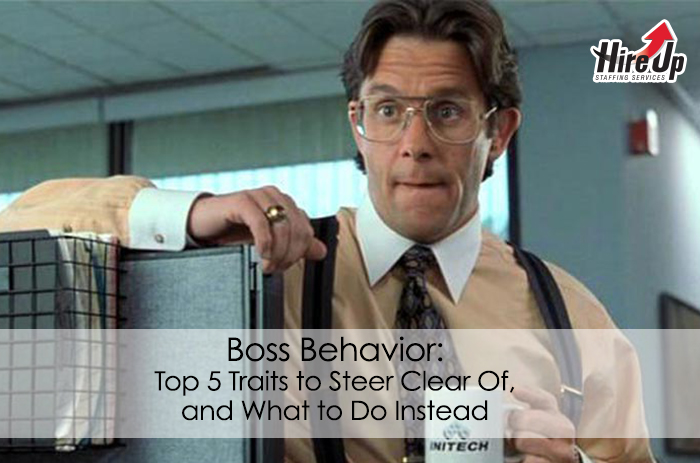Boss Behavior: Top 5 Traits to Steer Clear Of, and What to Do Instead
By hire-up-staffing in HRUpdates
In recent years, there has been much focus on the boss-employee dynamic. Things in the workplace are
changing with the times, and the view of what a leader should be has gone from totalitarian to
democracy.
However, according to a recent survey conducted by the LaSalle Network on 1,100 people, some offices
and bosses still have not changed from the traditional, thus deeming them as undeserving of the praise,
recognition and position that they currently hold.
Unfortunately, respondents of the survey feel negatively about their bosses, whether current or
previous, or both. Approximately 87% feel that way, or about 9 out of every 10 people, which is a really
adverse statistic considering it’s supposed to be those people who will lead us to the betterment of our
careers.
It has been found that 83% of the respondents would have transferred internally to a different position
because of such governance. In addition, a little over half of the respondents (51%) have admitted to
leaving a job because of their bad boss. What’s even more alarming is the fact that 55% of the
respondents never reported their bad boss to higher management in the company.
With the above survey-based statistics, what is the takeaway? Poor supervision and management is the
main reason people leave, and people feeling in the wrong when it comes to reporting terrible
leadership. They would rather find another job elsewhere instead.
People Don’t Quit Jobs – They Quit Managers
What does that mean? Companies are losing good, talented people because of poor leadership. Here
are the top five characteristics that signify bad boss qualities, which leaders should avoid at all costs,
ranked in ascending order:
#5 – Not willing to help employee learn (15%)
#4 – Doesn’t acknowledge employee’s hard work (16%)
#3 – Uncaring/not empathetic (18%)
#2 – Only notices negatives, never the positives (26%)
#1 – Never takes the blame, but first to take the credit (27%)
Whether you’re an employee or a manager, are you witnessing such behaviors in your workplace? If yes,
you should take action.
What Bosses Should Do Instead
Other than the obvious, which is to avoid the above mentioned traits, bosses should also aspire to do
the following:
Communicate well, and communicate often. Listen to your employees and do something about
whatever the topic of conversation is.
Lead by example. Effective leaders lead by doing rather than by pure talk.
Create and maintain trust. This is especially true for those transitioning from regular employee
to new boss.
Reframe relationships. It doesn’t mean you shouldn’t have fun, especially outside the office.
However, always remember that when at work, you still need to be responsible and lead.
Find a mentor. Just because you’re a boss doesn’t mean you know everything – find a leadership
mentor and have him or her guide you, regardless if you’ve been boss for five years or five
minutes.



